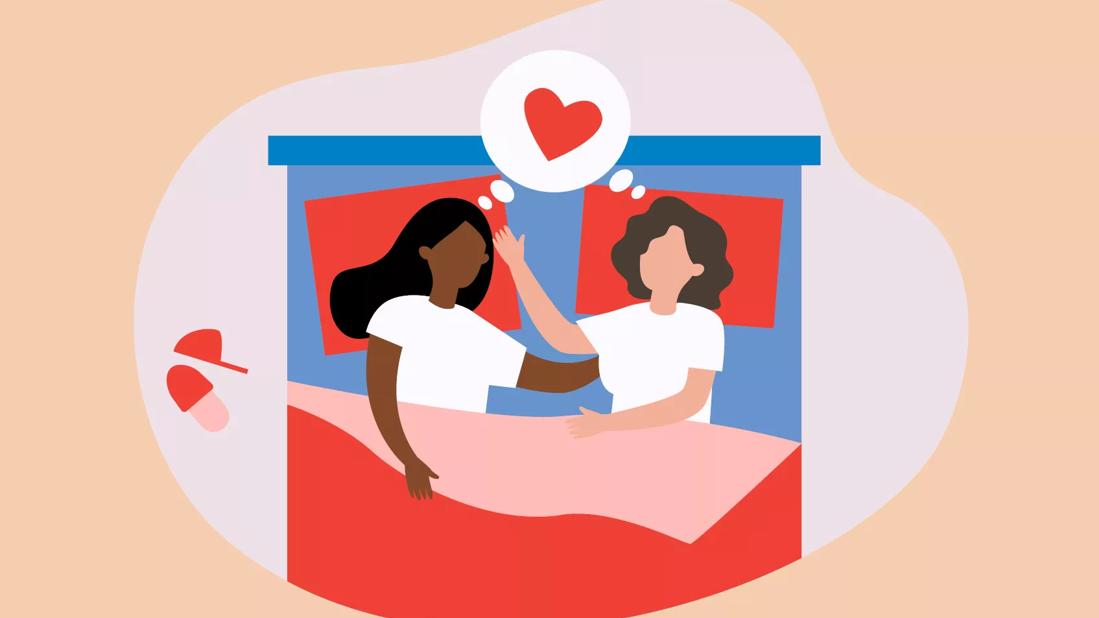Reap these physical, emotional and psychological advantages

We often think of sex as only for pleasure, but it also offers physical, emotional and psychological benefits.
Advertisement
Cleveland Clinic is a non-profit academic medical center. Advertising on our site helps support our mission. We do not endorse non-Cleveland Clinic products or services. Policy
Sex may burn calories, increase your heart health, help with pain and ease stress.
So, how often do you need to have sex to reap the rewards?
Psychologist Kia-Rai Prewitt, PhD, explains how sex can benefit you.
Yes, having a healthy sex life comes with many advantages.
“We think of sex as something that’s only for pleasure, reproduction or intimacy,” says Dr. Prewitt. “A lot of people don’t realize just how many benefits sex can have.”
Dr. Prewitt says that in order to receive benefits from sex, you should be having sex at least once or twice a week.
And if you aren’t in a committed relationship, you can get the same results through masturbation.
“You can learn things about your body — what feels good or what doesn’t,” says Dr. Prewitt. “It can be a stress reliever.”
If you have a hard time having an orgasm — a common occurrence in women — don’t fret.
“Just having a healthy sex life can boost self-esteem, self-confidence and your ability to experience pleasure,” says Dr. Prewitt. “But it also helps to connect with your partner and develop emotional intimacy.”
For women, sex can help work your pelvic muscles, which can help with urinary incontinence and bladder control.
“The more women have sex, the more it can help with vaginal lubrication, especially if you typically experience pain during sex,” explains Dr. Prewitt.
Advertisement
When it comes to men, having an orgasm or ejaculating frequently comes with its own benefit.
“Studies have shown it can help reduce their risk of prostate cancer,” notes Dr. Prewitt. “And that’s whether it’s with a partner or through masturbation.”
So, how can sex improve your life? Here are some ways.
Sex can be a form of moderate exercise — burning around 150 calories an hour, according to research. But don’t give up your gym membership.
“The American Heart Association recommends that adults engage in at least 150 minutes per week of moderate aerobic activity in addition to muscle-strengthening activity like using weights at least twice a week to maintain good health,” says Dr. Prewitt.
Dr. Prewitt adds that sex can also help strengthen different muscles throughout your body.
“Depending on how creative folks get, you might work in different muscles,” she says. “It definitely can be a form of exercise.”
A study suggests that women who had frequent sex were less likely to experience a cardiovascular event later in life.
“Having sex can improve your endurance,” says Dr. Prewitt. “And like exercising, those who have sex frequently tend to pay attention to their heart health. They’re eating better.”
But that same study warns that frequent sex can increase the risk of cardiovascular events in men, contradicting earlier research.
“The risk of having a heart attack is elevated during physical activity for people experiencing heart disease symptoms, so it’s important for men to speak to their doctor about their risks of having a heart attack during sex,” advises Dr. Prewitt.
Research shows that individuals who engage in sex one or two times a week have more immunoglobulin A (IgA) in their saliva. The antibody helps prevent illness and can help defend against human papillomavirus (HPV).
And when you have an orgasm, your body releases oxytocin.
“That can actually help you to fall asleep,” says Dr. Prewitt. “And if you’re getting good sleep or getting enough sleep, that can also help boost your immune system because you’re getting the rest that your body needs to recuperate.”
During sex, your body releases endorphins. Those endorphins act as your body’s natural pain reliever.
For those with migraines or headaches, research shows that sex may also help alleviate pain.
It can also help those who have pain during intercourse.
“Having regular sexual activity actually helps to build pelvic floor muscles and make it less painful,” says Dr. Prewitt.
Advertisement
Cortisol is your body’s main stress hormone. When you’re in a stressful situation, your cortisol levels elevate.
But research shows that those who have sex or are intimate with their partners see their cortisol levels fall back into the normal range.
The oxytocin and endorphins your body releases during sex may help lower cortisol levels.
“There are a lot of other ways that people can experience joy or happiness, that’s not connected to just having sex,” says Dr. Prewitt. “If you have a partner and you’re unable to have sexual intercourse, there’s still an emotional connection due to spending time together and doing the things that you enjoy. Engaging in relationships with people that you trust and who are supportive, those things are also beneficial to mental health.”
It’s important to remember to practice safe sex by using a condom or other form of contraception. Those who have unprotected sex have an increased risk of sexually transmitted infections and unplanned pregnancies.
If you notice that sexual intimacy is regularly uncomfortable, Dr. Prewitt recommends speaking to your primary care provider or a mental health specialist.
But whether you’re engaging in sex with a partner or through masturbation, having a healthy relationship with your body and sex can pay off in the long run.
Advertisement
“Sexuality is normal, it’s just a part of life,” reassures Dr. Prewitt. “People have different experiences with sex and how comfortable they are with it and talking about it. I think the important thing is to know that it is a normal part of the human experience.”
Advertisement
Learn more about our editorial process.
Advertisement

Arousal without orgasm can be uncomfortable, but it’s no reason to pressure sexual interactions

Some foods are thought to rev up your sex drive, despite lack of scientific evidence

If anxiety is keeping you from having the sex life you want, communication, education and therapy can help

Anorgasmia is a fairly common concern with a wide range of physical and psychological causes

Your sexual history directly influences your physical, mental and emotional health in a multitude of ways

‘Safer sex’ means STI prevention, avoiding unintended pregnancies and psychologically safe practices for everyone

Medications and therapy can help get your groove back

It’s perfectly normal for gas pockets to ‘evacuate’ during the motions of sex

Wearing a scarf, adjusting your outdoor activities and following your asthma treatment plan can help limit breathing problems

Your diet in the weeks, days and hours ahead of your race can power you to the finish line

When someone guilt trips you, they’re using emotionally manipulative behavior to try to get you to act a certain way